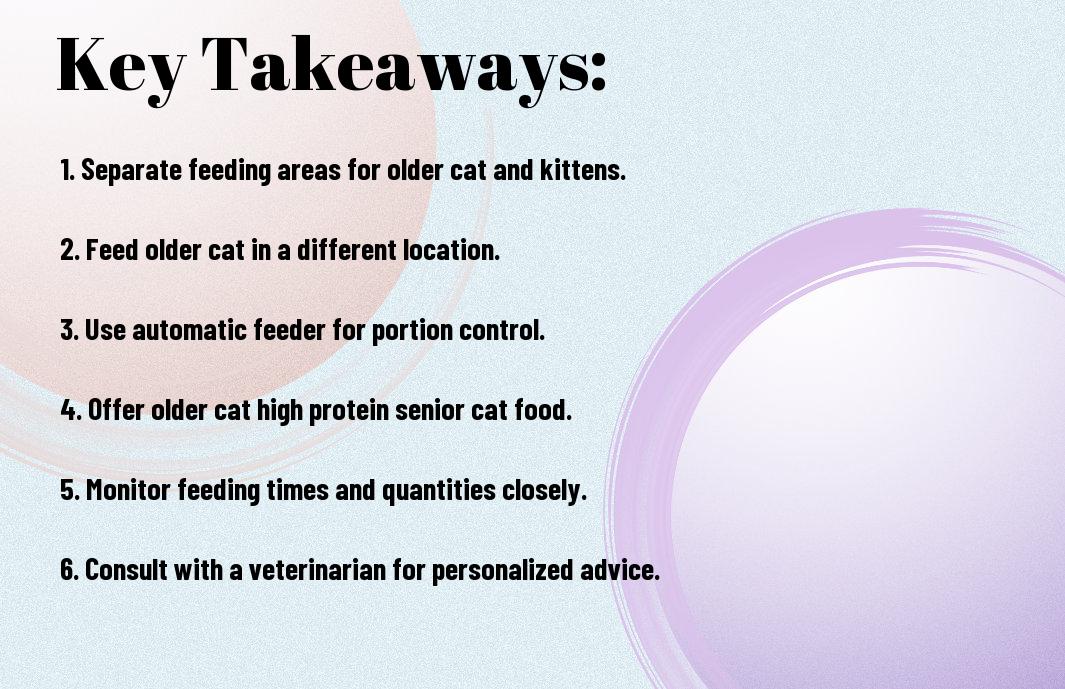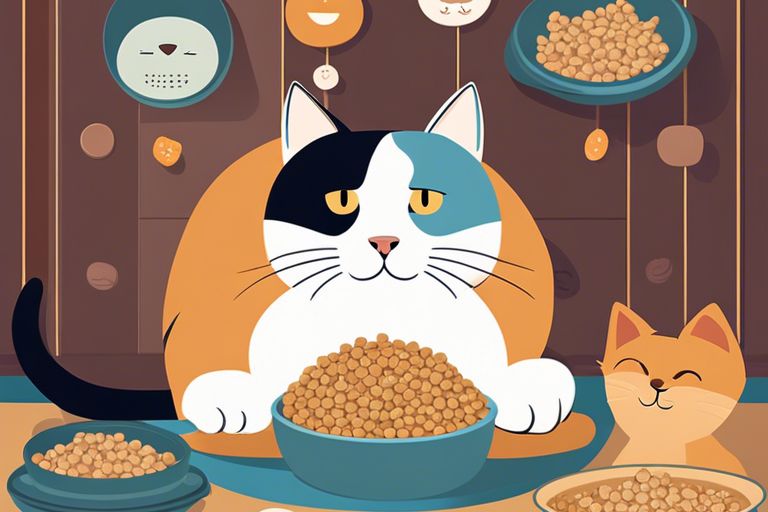Are you struggling to keep your older cat from devouring your precious kitten’s food? If so, you’re not alone. It’s important to address this issue as feeding your older cat kitten food can lead to nutritional imbalances and digestive issues. Fortunately, there are several effective strategies you can implement to prevent your older cat from stealing kitten food. By making some simple adjustments to your feeding routine and environment, you can ensure that both your older cat and kitten are getting the proper nutrition they need. In this blog post, we will discuss the reasons why older cats are drawn to kitten food and provide you with practical solutions to deter them from indulging in it.

Identifying the Problem
Now that you’ve noticed your older cat eating your kitten’s food, it’s important to take steps to address the issue before it becomes a long-term problem. Identifying the problem is the first step in finding a solution.
Signs Your Older Cat Is Eating Kitten Food
One of the signs that your older cat is eating kitten food is weight gain. If you notice that your cat is packing on the pounds despite not increasing their regular portion size, it could be a sign that they are consuming the higher calorie kitten food. Additionally, if your older cat’s stool becomes soft or runny, it may be due to the higher protein and fat content in kitten food, which can be harder for older digestive systems to handle. Furthermore, if your older cat is displaying increased energy levels or acting more territorial than usual, it could be a result of the higher protein intake from the kitten food.
Long-Term Risks of Improper Diet
Allowing your older cat to consume kitten food on a regular basis can have serious long-term health consequences. The higher fat and protein content in kitten food can lead to obesity and even cause strain on your cat’s liver and kidneys. Over time, this improper diet can lead to health issues such as diabetes, kidney disease, and arthritis. Additionally, the increased protein intake from kitten food can also exacerbate existing kidney or urinary tract issues in older cats.
It’s essential to address the issue of your older cat eating kitten food as soon as possible to prevent these potential health risks. Ensuring that your older cat sticks to an appropriate diet for their age and health is crucial in maintaining their well-being.
Preventative Strategies
One of the best ways to prevent your older cat from eating kitten food is to implement a few effective strategies. By making some simple adjustments, you can ensure that your kitten is getting the nutrition it needs without the interference of an adult cat.
Feeding Schedule Adjustments
One effective way to stop your older cat from eating kitten food is to establish a feeding schedule for both cats. By feeding them at separate times, you can ensure that your kitten has the opportunity to eat without competition from the older cat. Additionally, by sticking to a consistent schedule, you can train your older cat to understand that their food is only available at certain times, reducing the likelihood of them snacking on the kitten’s food.
Spatial Feeding Solutions
Another preventative strategy is to create separate feeding areas for your cats. By providing the kitten with their own designated feeding space, you can eliminate the older cat’s access to the kitten’s food. This could be achieved by feeding one cat in a separate room or using a barrier to create a divide between their feeding areas. By doing so, you can ensure that each cat is receiving the appropriate diet without interference from the other.
Behavioral Interventions
To address the issue of your older cat eating kitten food, you will need to implement behavioral interventions. These interventions will help modify your cat’s behavior and successfully stop them from accessing the kitten food.
Training Older Cats
If your older cat is consistently eating kitten food, it may be necessary to implement training techniques to modify their behavior. You can start by feeding your older cat and the kitten in separate rooms. This will prevent the older cat from accessing the kitten food and allow them to focus on their own meals. Additionally, you can consider using positive reinforcement techniques, such as giving your older cat a treat or praise when they leave the kitten food untouched. Over time, your older cat will learn to associate their own food with positive experiences, reducing their interest in the kitten food.
Managing Feeding Behavior
Another effective approach to stopping your older cat from eating kitten food is to manage their feeding behavior. This can be done by establishing a feeding schedule for both your older cat and the kitten. By providing consistent mealtimes, you can control when and where your cats have access to their food. Additionally, you can consider using feeding stations that are inaccessible to your older cat, such as elevated platforms or enclosed feeding areas. This will prevent the older cat from reaching the kitten food, reducing the likelihood of them eating it.

Additional Tips and Considerations
Unlike kitten food, older cat food is formulated to meet the nutritional needs of senior cats. Here are some additional tips to help you stop your older cat from eating kitten food:
- Place the kitten food in a separate room or area where the older cat cannot access it.
- Feed the older cat and the kitten in separate feeding areas at the same time.
- Try feeding the older cat a higher protein senior cat food to satisfy their hunger and nutritional needs.
This will help ensure that your older cat is receiving the appropriate nutrition for their life stage and reduce the risk of them overeating kitten food.
Selecting Appropriate Food for Different Life Stages
When it comes to feeding your cats, it is crucial to select the right food for their life stage. Kitten food is specifically formulated to meet the high energy and nutritional needs of growing kittens, while older cat food is designed to support the health and well-being of senior cats. By feeding appropriate food for each life stage, you can ensure that your cats are receiving the right balance of nutrients to support their overall health and well-being.
Monitoring Health and Weight Changes
As your cats age, it’s essential to monitor their health and weight to ensure they are maintaining a healthy body condition. Keep an eye on their appetite, energy levels, and weight changes, as these can be indicators of underlying health issues. If you notice any significant changes, it’s essential to consult your veterinarian to address any potential health concerns.

How to Stop Older Cat from Eating Kitten Food
Summing up, it is important to take action to prevent your older cat from eating kitten food in order to maintain their health and prevent potential dietary issues. To do this, ensure that you feed your cats separately in different locations. Consider feeding your older cat in a separate room or area and provide them with their own food and water dishes. Additionally, monitor their meal times and remove any uneaten kitten food promptly. By taking these steps and establishing a consistent feeding routine, you can effectively prevent your older cat from consuming the higher fat and protein content of kitten food.
FAQ
Why is it important to keep older cats from eating kitten food?
Older cats have different nutritional needs than kittens. Kitten food is higher in calories and nutrients to support the rapid growth of a kitten. Feeding an older cat kitten food can lead to obesity and other health issues. It’s important to ensure that each cat is receiving the appropriate nutrition for their life stage.
How can I stop my older cat from eating kitten food?
One way to prevent your older cat from eating kitten food is to feed them separately. Create designated feeding areas for each cat and feed them at the same time every day. This will help them associate their own food with mealtime and reduce the likelihood of them eating each other’s food. Additionally, consider using feeding stations with controlled-access doors or automatic feeders to further prevent the older cat from accessing the kitten’s food.
What are the potential consequences of an older cat eating kitten food?
If an older cat continues to consume kitten food, it can lead to weight gain, digestive issues, and nutritional imbalances. Obesity in cats can contribute to various health problems, such as diabetes, arthritis, and heart disease. Ingesting excessive amounts of nutrients, such as protein and fat, can also strain the older cat’s kidneys and liver. It’s crucial to monitor and regulate the older cat’s diet to ensure their long-term health and well-being.

Hello there, I am Iftekhar Ahmed. I am the owner of Mishka & The Cat Corners. I love to explore and write on various topics about cats

